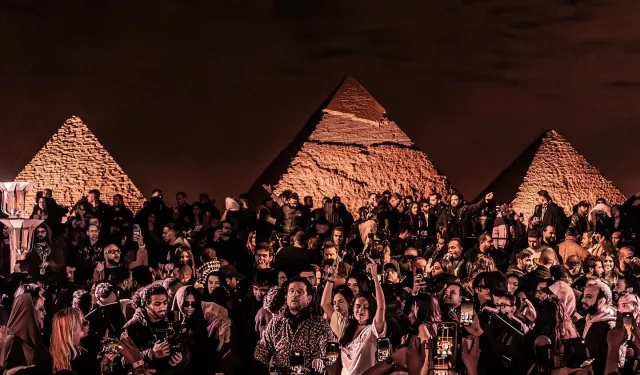The Egyptian Center for Economic and Social Rights/ECESR has filed a lawsuit with the Administrative Court to protect the Pyramids from “the danger of loud parties,” urging authorities to enforce oversight and supervision at the Giza Plateau.
Case No. 1958/80 calls for activating the role of relevant authorities to address “violations” in the Pyramids area — particularly late-night, high-decibel celebrations held within the archaeological site. These events use sound systems that generate vibration frequencies capable of loosening ancient stonework, along with laser lighting that fails to meet international standards for heritage illumination.
The ECESR filed the case on behalf of Egyptologist Monica Hanna, tour guide and researcher Sally Salah El-Din, and human rights lawyer Malek Adly. The defendants are the minister of tourism and antiquities, the secretary-general of the Supreme Council of Antiquities, and the Giza governor, all named in their official capacities.
The suit also seeks to prohibit any digging or construction, whether temporary or permanent, in the area for the purpose of staging such events.
In May 2016, the Supreme Council of Antiquities set rules for hosting events at museums and archaeological sites, including that “no activity may entail alterations or additions to an antiquities building; event setups must not disfigure the structure or its artistic elements; no potential hazards may result from installations; and organizers must provide all undertakings necessary to preserve the building or site.”
In a statement, ECESR said the suit is grounded in the Egyptian Constitution, Antiquities Protection Law No. 117 of 1983, and the UNESCO World Heritage Convention. This obliges Egypt to take legislative and administrative measures to safeguard heritage sites as property of the people and of humanity as a whole.
The statement added that the administration “has refrained from its duty to protect the monument despite knowing that late-night celebrations are being held within the site using the equipment mentioned above, accompanied by temporary and permanent digging and construction to stage these events.”
ECESR called this “a grave danger to the safety of the Pyramids and their historic setting, and a breach of legality and of the state’s duty to preserve public funds and national heritage.”
Egypt has recently seen private parties and weddings at museums and archaeological zones, including the wedding of actor Ahmed Zaher’s daughter, Laila, to producer-artist Hesham Gamal at the Saqqara Necropolis area; the wedding of Indian billionaire Ankur Jain and Erika Hammond at the Giza Pyramids; and a Deep House Bible concert at the same site.
In January 2023, the House of Representatives Tourism Committee discussed two briefings about the Tourism Ministry’s approval to rent the Pyramids’ plateau and surrounding area for weddings and celebrations. The committee said the Pyramids are a unique archaeological zone and a venue for cultural and artistic exhibitions, sports competitions, and fashion shows.
It added that the Tourism Ministry’s role is to protect the destination’s reputation, preserve the archaeological and historical value of Egyptian antiquities, and avoid squandering gains from the sector’s recent recovery.
In May last year, former Supreme Council of Antiquities secretary-general Mohamed Abdel Maqsoud criticized parties held beside the Pyramids, saying in media remarks that they “affect the reputation and protected nature of antiquities.”
